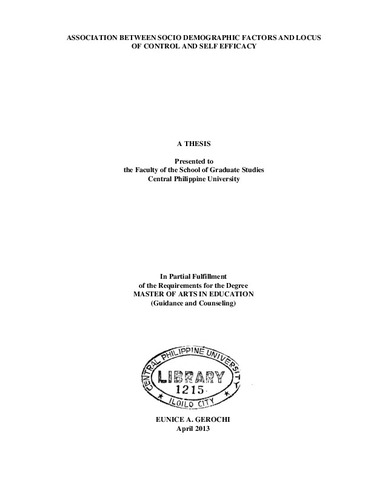Association between socio demographic factors and locus of control and self efficacy
요약
This correlational study was conducted in order to determine the association between socio demographic factors to locus of control and self efficacy. Specifically it sought to describe the respondents according to sex, type of residence, the high school in which they attended, their parents’ highest educational attainment, parent’s employment status and birth order. It also sought to determine the locus of control of students whether it varies according to their socio demographic factors such as sex, type of residence, the high school in which they attended, their parents’ highest educational attainment, parent’s employment status and birth order. Moreover, it also sought to determine the general self efficacy of the students whether it varies according to their socio demographic factors such as, sex, type of residence, the high school in which they attended, their parents’ highest educational attainment, parent’s employment status and birth order. Furthermore, this tried to discover the relationship between socio demographic factors and locus of control and self efficacy. Lastly, this study tried to determine the relationship between
locus of control and self efficacy.
This study involved 357 freshmen college students from Central Philippine University. The data gathering instruments used in this study was the Internal Control Index by Patricia Duttweiller and the General Self Efficacy Scale by Schwarzer and Jerusalem (1995). Findings revealed that majority of the respondents were female, 55.2 percent of the respondents finished in public high schools and most of their parents are employed and have college degrees, and most of the students are first and middle borns. The results also showed that the mean locus of control of the students is 994.25. Males are more external compared with females, thus, females were internally oriented. Those who came from private schools were externally oriented and those who came from public schools showed internality. With regards to the respondents’ parents’ educational attainment, those whose mothers finished college were externally oriented and those whose mothers finished elementary were internal. In addition, those whose mothers’ are employed are external and those who have unemployed mothers are internals. As to the fathers, those whose fathers finished elementary were external and those who finished high schools were internal. Those who have employed fathers showed externality while those whose fathers who are unemployed showed internality.
In terms of birth order, last borns are externals while middle borns are internals.
The mean self efficacy of the students is 30.66. Males tend to have low self efficacy while girls tend to be efficacious. Those who live in urban areas have low self efficacy on the other hand those who live in the rural areas have high self efficacy. Private school graduates have low self efficacy while those who came from public schools have high self efficacy.
With regards to their parents, those whose mothers finished college have low self efficacy, while those whose mothers finished high school only have high efficacy. Those whose mothers that have jobs have low self efficacy while those whose mothers have no jobs have high self efficacy. As to the fathers, those whose fathers finished college have low self efficacy, while those whose fathers finished elementary grades only have high self efficacy.
In terms of birth order, last borns have low self efficacy while middle boms have
high self efficacy.
The results of this study also revealed that there is a significant difference between the respondent’s high school attended and his locus of control, however, there is no significant difference between the respondent’s sex, type of residence, mother and fathers’ educational attainment, mother and fathers’ employment status and birth order and his locus of control. Moreover, there is no significant difference between the respondent’s sex, type of residence, high school attended, educational attainment of mother and father, mother and fathers’ employment status, and birth order and his self efficacy. Lastly, the study revealed that there is no significant difference between locus of control and self efficacy.
Recommendations given were focused on the awareness that teachers must possess about locus of control and self efficacy. Teachers have a role in enhancing locus of control and self efficacy by the use of encouragement and praise. Students should also must be aware of their traits so that they can improve their locus of control and self
efficacy.
기술
Abstract only
추천 인용
Gerochi, E. A. (2013). Association between socio demographic factors and locus of control and self efficacy (Unpublished Master's thesis). Central Philippine University, Jaro, Iloilo City.
유형
Thesis주제
학과
School of Graduate Studies정도
Master of Arts in Education major in Guidance and Counseling선반 위치
GSL Theses 378.242 G319
물리적 설명
xiv, 88 leaves
Collections
다음 라이센스 파일이이 항목과 연관되어 있습니다.



